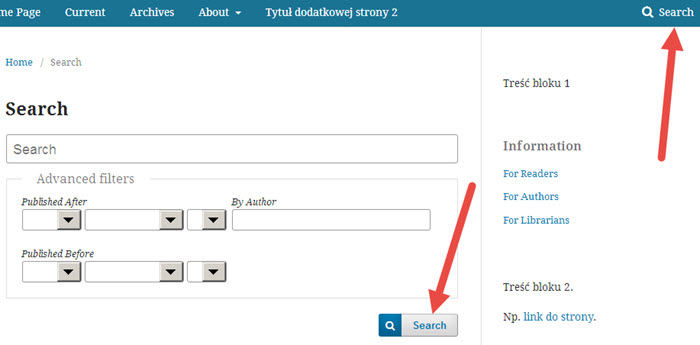After updating OJS from version 3.1.2.4 to 3.2.1.1, blank white pages appear. I found two such situations, maybe there are more of them?
First sytuation.
Reader interface → “Search” function
After clicking the “Search” button, an empty white page appears. This applies to both simple and advanced search.

More information.
In the config.inc.php version 3.1.2.4 I had the following settings:
locale = en_US
client_charset = utf-8
connection_charset = utf8
database_charset = utf8
In version 3.2.1.1, “database_charset” was removed and “collation = utf8_general_ci” was added. So I have these settings:
locale = en_US
client_charset = utf-8
connection_charset = utf8
collation = utf8_general_ci
Clicking the “Search” button displays the following message:
Fatal error: Uncaught Exception: DB Error: Illegal mix of collations (utf8_general_ci,IMPLICIT) and (utf8_polish_ci,IMPLICIT) for operation ‘=’ Query: SELECT o.submission_id, MAX(s.context_id) AS journal_id, MAX(i.date_published) AS i_pub, MAX(p.date_published) AS s_pub, COUNT(*) AS count FROM submissions s JOIN publications p ON (p.publication_id = s.current_publication_id) JOIN publication_settings ps ON (ps.publication_id = p.publication_id AND ps.setting_name=‘issueId’) JOIN issues i ON (CAST(i.issue_id AS CHAR) = ps.setting_value) JOIN submission_search_objects o ON (s.submission_id = o.submission_id) NATURAL JOIN submission_search_object_keywords o0 NATURAL JOIN submission_search_keyword_list k0 WHERE s.status = 3 AND i.published = 1 AND k0.keyword_text = ? AND i.journal_id = ? GROUP BY o.submission_id ORDER BY count DESC LIMIT 500 in /home/www/ojs3/html/lib/pkp/classes/db/DAO.inc.php:703 Stack trace: #0 /home/www/ojs3/html/lib/pkp/classes/db/DAO.inc in /home/www/ojs3/html/lib/pkp/classes/db/DAO.inc.php on line 703
I tried various combinations:
- “database_charset = utf8” and “collation = utf8_general_ci”
- only “database_charset = utf8”
- only “collation = utf8_general_ci”
- none of these options
In each of these cases, the same error message is displayed.
Regards
Wojtek
